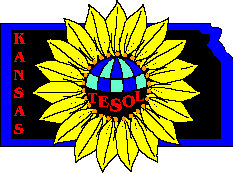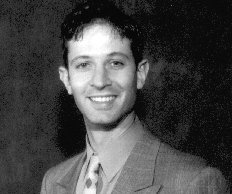
March 2003
Profile:
Matthew Scelza
Profile:
Marc Helgesen
Phonics Boring?
Teachers Debate Iraq War
Innovation & Tradition
![]()
/ Index /
/ Letters /
/ Search /
![]()
Subscribe
for free!
Achievement Profile: Matthew Scelza
Literacy and Advocacy in ESL
Matthew Scelza is making a positive difference today in the field of adult ESL education. He is the Project Director for PEACE (Process of English and Civics Education), a U.S. Department of Education grant. He is the Statewide Program Director for California Literacy, Inc. He is Project Director of the English as a Second Language Special Collection, at the Literacy Information and Communication System (LINCS), under the auspices of the National Institute For Literacy. Mr. Scelza holds a B.A. in American Studies and an M.A. in Education, Curriculum and Teacher Education, both from Stanford University.
Some Matthew Scelza links:
LINCS English as a Second Language Special Collection (www.literacynet.org)
Selection Criteria for the LINCS ESL Special Collection (www.literacynet.org)
ESL Special Collection Mini-Grants
(www.efcafe.com)
ESL News Flashes
California Literacy, Inc. (www.caliteracy.org)
The Process of English And Civics Education (PEACE) Curriculum (U.S. Department of Education Grant)
An ESL MiniConference Online interview
with Matthew Scelza:

What is your main ESL activity now? What are your principal projects, and what is on the back burner?
My main ESL activity is the coordination of the National Institue for Literacy's ESL Special Collection. The ESL Special Collection is a free, online gateway to the best materials in the field of ESL. I work with two partners, Andy Nash of World Education and Tom Mueller of ProLiteracy America, to identify and review relevant materials for the ESL Collection. The Web site is www.literacynet.org/esl.
I am also the Project Director on one of 12 EL/Civics grants awarded by the United States Department of Education in 2000. We're completing the finishing touches on the PEACE Curriculum, an action-oriented Civics curriculum designed for use by low-level learners and by all types of instructors, including volunteer tutors. More information about the PEACE curriculum is available at www.caliteracy.org/education/esl-civics/index.html.
How did you start your ESL career? Who influenced your decision? What were some important formative experiences in the early stages of your development?
I chose to work with adults and non-profits because of a personal desire to work directly with adults who were acting to empower themselves and their communities. In college, I was influenced by a group of friends who were fun, smart and political. We influenced each other in exploring what we could do to make our lives meaningful through political action. For me, I found the work of Paolo Freire and Myles Horton had a significant influence upon me, and led me to prefer community work that merges education with community organizing.
After graduating with my B.A. and my Master's Degree in Education, I began working with ESL learners as a VISTA volunteer in Boston. Following my VISTA service, I moved to New York City. I was born in New York, and my family is still there. I worked for about two years as a full-time ESL Instructor at Bronx Community College's BEGIN program.
In New York, I learned that the field is a fragmented system. That negatively impacts every aspect of the field. Rather than seeing the ESL program I was part of as a piece of a whole, the powers that be focused solely on how this individual program could be more efficient. Gradually, the program I joined shifted from a program that focused on education to a program that focused on workforce devleopment. That shaped how I see funding sources and the field of ESL as a whole.
What are the four or five language/culture backgrounds with which you are most familiar as a teacher? Which ones are you familiar with from the perspective of a language learner yourself? What insights have you gained in how to meet the needs of English learners from these cultures and language backgrounds?
As a teacher, I have worked mostly with Spanish speakers from Puerto Rico, Dominican Republic and Mexico. One humorous aspect of the work I did in New York was the level of respect I was given by the learners in my classroom. I was barely out of graduate school, and I was called "Profesor."
As a self-described popular educator, I found it difficult to engage learners in non-traditional activities. They entered the classroom with very traditional views of education and how the teacher should act. When I wasn't the traditional teacher, it was a challenge for many learners to "go with me."
I now have a better understanding of how to blend the traditional and non-traditional aspects of education.
If you had to give three pieces of advice to a new ESL teacher, what would they be?
1. Are you in the field because of your commitment to the learner's personal growth? Are you in the field for your own personal growth? Are you in the field because it's a flexible working environment? There is no one right reason, but I think that everyone should know what their answer is. It's a challenging field for many reasons, and having that one clear reason to hold to is very important.
2. The field loses so many teachers every year to various stages of frustration, with burnout being the most obvious example. One of the struggles for the field is the ability to retain qualified teachers.
3. Join TESOL and other organizations, and push for an adult education system that is coherent, integrated and well-funded. It is not someone else's job to advocate for ESL teachers. It is ESL teachers' job to advocate for themselves and their learners.
What do you see as the most important issues facing the ESL/EFL teaching profession today?
I think that one key consideration facing the ESL teaching profession is the shift in demographics of ESL learners. Especially in California, we're seeing more and more learners who have a very limited education in their native country. That dramatically impacts the classroom environment.
Interviewed by Robb Scott
2003 ESL MiniConference Online